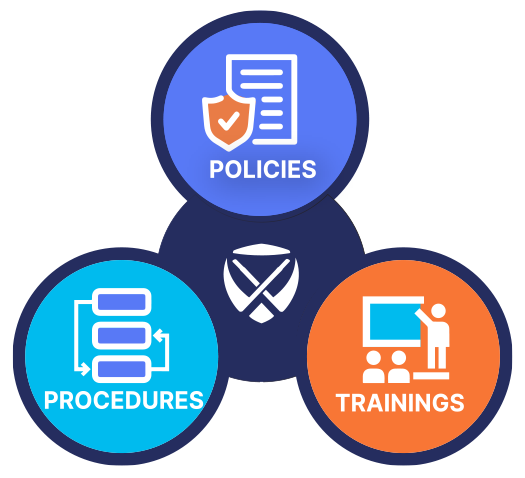Security policies are documents that help to define expectations around security, ensuring the confidentiality, integrity, and availability of information and resources within an organization. They serve as a guiding landmark for navigating security. When thought of abstractly, policies can be considered as the “what” is going to be done. Once approved and implemented, security policies need to be updated only rarely. Strong policies, when followed, will not only protect information and systems, but also employees, customers, and the organization itself.
In order to make sure that systems, networks, and data remain securely protected, an organization needs a set of policies that establish a common understanding of commitment towards security. For a comprehensive security program, in addition to security policies, a set of procedures and a training program are needed. Procedures can be thought of as the “how” will it be done. A training program is needed to ensure that all relevant people in your organization know the policies as well as their roles and responsibilities in adhering to, and/or enforcing, those policies.
Many US organizations build their security policies to align with the NIST 800-53 cybersecurity standard and compliance framework developed by the National Institute of Standards in Technology. This continuously updated framework strives to define standards, controls, and assessments based on risk, cost-effectiveness, and capabilities, and many of the industry specific compliance certifications (such as HITRUST, SOC-2SOC 2 is a type of Service Organization Control (SOC) report that evaluates the effectiveness of an organization's controls related to security, availability, processing integrity, confidentiality, and privacy. These reports are based on the Trust Services Criteria (TSC) developed by the AICPA and are commonly used by technology and cloud service providers to demonstrate compliance with industry standards and best practices., FedRAMP) align with NIST 800-53NIST 800-53 is a special publication by the National Institute of Standards and Technology (NIST) that provides a catalog of security and privacy controls for federal information systems and organizations. The publication outlines security requirements and guidelines for the selection, implementation, and assessment of security controls to protect the confidentiality, integrity, and availability of information systems. standards. NISTNIST stands for the National Institute of Standards and Technology, which is a US government agency responsible for developing and publishing standards and guidelines related to information security and cybersecurity. 800-53 also covers all aspects of cybersecurity, including those related to:
Jemurai built SecurityProgram.io (SPIO) to help organizations design and implement cybersecurity policies, procedures, and training quickly, easily, and at cost effectively. SPIO provides templated policies written so that most companies can adopt them "as is." These policies are also mapped to clearly defined tasks that your IT department and other relevant staff will need to complete in order to meet the requirements of those policies. SPIO’s policy templates are simple yet comprehensive, and they have been used by clients to pass security audits or demonstrate security during acquisitions or sales diligence. SPIO also provides an online editor and version control, as well as the ability to upload and track your own policies, ensuring that all policies are up to date and that changes are trackable.
SPIO also provides a simple policy acknowledgement capability to assist you with tracking employee acknowledgement of policies. Using SPIO, it is easy to deploy policies and confirm employee policy acknowledgement (a requirement of many security certifications). Employees can use their existing SSO credentials to sign on with Google Workspace or Microsoft Office 365 for seamless invitation for them to review and acknowledge policies.
With SPIO, your security posture will be strengthened by our simple-to-deploy policies, procedures, and training.


SPIO helps SMBs implement comprehensive cybersecurity. Start a free trial today to track the policies, procedures, and tasks needed to be confident in your security posture.